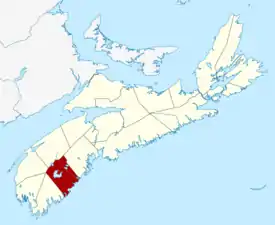Queens County, Nova Scotia
Queens County is a county in the Canadian province of Nova Scotia.
Queens County, Nova Scotia | |
|---|---|
County | |
 | |
| Coordinates: 44.2°N 65.0°W | |
| Country | Canada |
| Province | Nova Scotia |
| Municipality | Region of Queens Municipality |
| Established | July 21, 1762 |
| Incorporated | April 17, 1879 |
| Amalgamated | April 1, 1996 |
| Electoral Districts Federal | South Shore—St. Margarets |
| Provincial | Queens-Shelburne |
| Area | |
| • Total | 2,398.63 km2 (926.12 sq mi) |
| Population (2011) | |
| • Total | 10,960 |
| • Density | 4.6/km2 (12/sq mi) |
| Time zone | UTC-4 (AST) |
| Area code | 902 |
| Median Earnings* | $39,972 |
| Website | regionofqueens.com |
Part of a series about Places in Nova Scotia | |
History
Liverpool, the county seat of Queens County, was founded in 1759 by the New England Planters. Founded for the most part by New England settlers, Liverpool maintained strong ties with the American colonies until the sudden outbreak of the American Revolution.
On July 21, 1762 the Lieutenant Governor and Council of Nova Scotia declared that "the Townships of Liverpool, Barrington and Yarmouth together with the intermediate lands should be erected into a county by the name of Queens County". Parts of the new county were taken from Lunenburg County, which now lies to the northeast.
In 1784, Shelburne County was formed in part from southwestern portions of Queens County. The new county boundaries were established by an Order-in-Council dated December 16, 1785.
Queens County contains substantial portions of Kejimkujik National Park, including the main body of the park inland north of Caledonia and the Seaside Adjunct near Port Joli and Port Mouton.
In 1996, the county's municipal government merged with the town of Liverpool to form the Region of Queens Municipality, thus the county is contiguous with the boundaries of the regional municipality, minus First Nations reserves.
Demographics
As a census division in the 2021 Census of Population conducted by Statistics Canada, Queens County had a population of 10,501 living in 5,005 of its 6,705 total private dwellings, a change of 1.4% from its 2016 population of 10,351. With a land area of 2,393.44 km2 (924.11 sq mi), it had a population density of 4.4/km2 (11.4/sq mi) in 2021.[1]
|
|
Ethnic Groups (2006)[5]
|
Communities
- Regional municipalities
- Towns
- Villages
- Reserves
See also
References
- "Population and dwelling counts: Canada and census divisions". Statistics Canada. February 9, 2022. Retrieved April 2, 2022.
- Censuses 1871-1941
- Statistics Canada: 1996, 2001, 2006 census
- Statistics Canada: 2011 census
- 2006 Statistics Canada Census Ethnocultural Portrait of Canada: Queens County, Nova Scotia